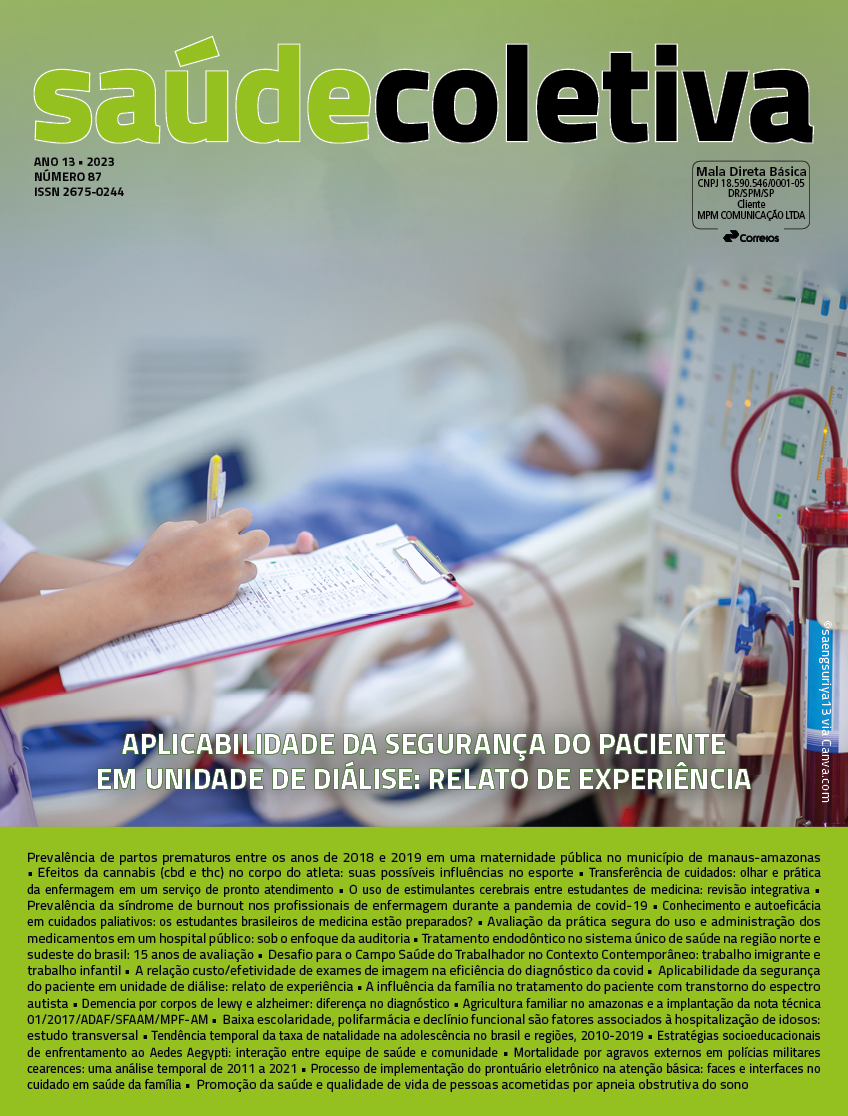Knowledge and self-efficiency in palliative care: are brazilian medicine students prepared for it?
DOI:
https://doi.org/10.36489/saudecoletiva.2023v13i87p12897-12915Abstract
Introduction: Palliative care (PC) is considered an integral part of health care systems and an inalienable element of citizens' rights. Studies have shown that doctors do not receive formal training in communication and other essential aspects when dealing with terminally ill patients. Objectives: The aim was evaluate knowledge in PC of medical students in the fourth, fifth and sixth year of a public university in the State of São Paulo, Brazil. Methods: Data were collected in the form of an online questionnaire. Data were collected in the form of an online questionnaire, with anonymous completion, carried out on a completely voluntary basis. The questionnaires addressed personal characteristics and their relationship with PC, the “Bonn Test on knowledge in palliative care” and a self-efficacy questionnaire on PC. The total number of study participants was 105 students, 71.4% female, with a mean age of 24.5 years ± 2.1 years. The total average score for the “Bonn Test on knowledge in palliative care” was 66.96%. As for the self-efficacy questionnaire, the average agreement was 64.75%, and all participants consider it important to incorporate PC content into the medical curriculum. Thus, it is concluded that the knowledge of medical students in general is insufficient, even with some of them taking a theoretical course in PC during graduation.
References
-World Health Organization. WHO definition of palliative care [Internet]. Disponivel : www.who.int/cancer/palliative/definition/en/. Acesso em 15/04/2023
-Gómez-Batiste X, Blay C, Roca J, Fontanals MD. Innovaciones conceptuales e iniciativas de mejora en la atención paliativa del siglo XXI. Med Paliat. 2012; 19(3):85-86. DOI: https://doi.org/10.1016/j.medipa.2012.05.006
-Comité de Ministros del Consejo de Europa. Recomendación Rec (2003) 24 del Comité de Ministros de los estados miembros sobre organización de cuidados paliativos.
- Carência no atendimento. Revista APM. 2007;(583):20-21.
- Schonwetter RS. The emergence of palliative care. Cancer Control. 2001;8(1):3-5. Editorial. DOI: https://doi.org/10.1177/107327480100800101
Blasco PG. O médico de família hoje. São Paulo: SOBRAMFA;1997.
-Carvalho RT, Parsons HA. Manual de Cuidados Paliativos ANCP - 2ª edição. ANCP (Academia Nacional de Cuidados Paliativos); 2012.
-Diver R, Quince T, Barclay S, Benson J, Brimicombe J, Wood D, Thiemann P. Palliative care in medical practice: medical students' expectations. BMJ Supportive & Palliative Care 2018;8:285–288. DOI: https://doi.org/10.1136/bmjspcare-2017-001486
-Anneser, J, Kunath, N, Krautheim, V, Borasio, GD. Needs, expectations, and concerns of medical students regarding end-of-life issues before the introduction of a mandatory undergraduate palliative care curriculum. J Palliat Med. 2014;17(11):1201–1205. DOI: https://doi.org/10.1089/jpm.2013.0614
-Stepanyan KD, Weiss TE, Pessegueiro AM, Pietras CJ. Lessons From the Development and Implementation of a Palliative Care Elective for Fourth-Year Medical Students: A Pilot Study. Am J Hosp Palliat Care. 2020;37(3):191-195. DOI: https://doi.org/10.1177/1049909119872976
-Rai A, Mason S. The developing and evaluation of an electronic tool to assess the effect of undergraduate training in palliative care: the electronic international medical education in palliative care (IMEP-e) assessment tool. BMC Palliat Care. 2019; 18(1):76. DOI: https://doi.org/10.1186/s12904-019-0460-3
-Fraser, HC, Kutner, JS, Pfeifer, MP. Senior medical students’ perceptions of the adequacy of education on end-of-life issues. J Palliat Med. 2001;4(3):337–343. DOI: https://doi.org/10.1089/109662101753123959
-Minosso JSM, Martins MMFPS Martins, Oliveira MAC. Adaptação transcultural do Bonn Palliative Care Knowledge Test: um instrumento para avaliar conhecimentos e autoeficácia. Rev. Enf. Ref. 2017;(13):31-42. DOI: https://doi.org/10.12707/RIV16076
-Gomez-Batiste X, Connor S, editors. Building Integrated Palliative Care Programs & Services. Catalonia: Liberdúplex; 2017.
-Knaul FM, Farmer PE, Krakauer EL, De Lima L, Bhadelia A, Jiang Kwete X, Arreola-Ornelas H, Gómez-Dantés O, Rodriguez NM, Alleyne GAO, Connor SR, Hunter DJ, Lohman D, Radbruch L, Del Rocío Sáenz Madrigal M, Atun R, Foley KM, Frenk J, Jamison DT, Rajagopal MR; Lancet Commission on Palliative Care and Pain Relief Study Group. Alleviating the access abyss in palliative care and pain relief-an imperative of universal health coverage: the Lancet Commission report. Lancet. 2018 Apr 7;391(10128):1391-1454. DOI: https://doi.org/10.1016/S0140-6736(17)32513-8
-Pfister D, Muller M, Muller S, Kern M, Rolke R, Radbruch L. Validation of the Bonn test for knowledge in palliative care (BPW). Schmerz. 2011;25(6):643–53. DOI: https://doi.org/10.1007/s00482-011-1111-7
-Nakazawa Y, Miyashita M, Morita T, Umeda M, Oyagi Y, Ogasawara T. The palliative care knowledge test: reliability and validity of an instrument to measure palliative care knowledge among health professionals. Palliat Med. 2009;23(8):754–66. DOI: https://doi.org/10.1177/0269216309106871
-Wilson O, Avalos G, Dowling M. Knowledge of palliative care and attitudes towards nursing the dying patient. Br J Nurs. 2016;25(11):600–5. DOI: https://doi.org/10.12968/bjon.2016.25.11.600
-Kassa H, Murugan R, Zewdu F, Hailu M, Woldeyohannes D. Assessment of knowledge, attitude and practice and associated factors towards palliative care among nurses working in selected hospitals, Addis Ababa, Ethiopia. BMC Palliat Care. 2014;13(1):6. DOI: https://doi.org/10.1186/1472-684X-13-6
-Ayed A, Sayej S, Harazneh L, Fashafsheh I, Eqtait F. The Nurses' knowledge and attitudes towards the palliative care. J Educ Pract. 2015;6(4):91–9.
-Huijer AH, Dimassi H. Palliative care in Lebanon: knowledge, attitudes and practices of physicians and nurses. J Med Liban. 2007;55(3):121–8.
-Budkaew J, Chumworathayi B. Knowledge and attitudes toward palliative terminal cancer care among Thai generalists. Asian Pac J Cancer Prev. 2013; 14(10):6173–80. DOI: https://doi.org/10.7314/APJCP.2013.14.10.6173
-Snyder S1, Hazelett S, Allen K, Radwany S. Physician knowledge, attitude, and experience with advance care planning, palliative care, and hospice: results of a primary care survey. Am J Hosp Palliat Care. 2013 Aug;30(5):419-24. DOI: https://doi.org/10.1177/1049909112452467
-Krautheim V, Schmitz A, Benze G et al. Self-confidence and knowledge of German ICU physicians in palliative care – a multicentre prospective study. BMC Palliat Care, 2017;16(1):57. DOI: https://doi.org/10.1186/s12904-017-0244-6
-Henderson A, Rowe J, Watson K, Hitchen-Holmes D. Graduating nurses' self-efficacy in palliative care practice: An exploratory study. Nurse Educ Today. 2016; 39:141-146. DOI: https://doi.org/10.1016/j.nedt.2016.01.005
-Spineli VMCD. Conhecimento e autoeficácia em cuidados paliativos da enfermeiros da atenção primária à saúde (tese). São Paulo. Escola de Enfermagem;2019.







